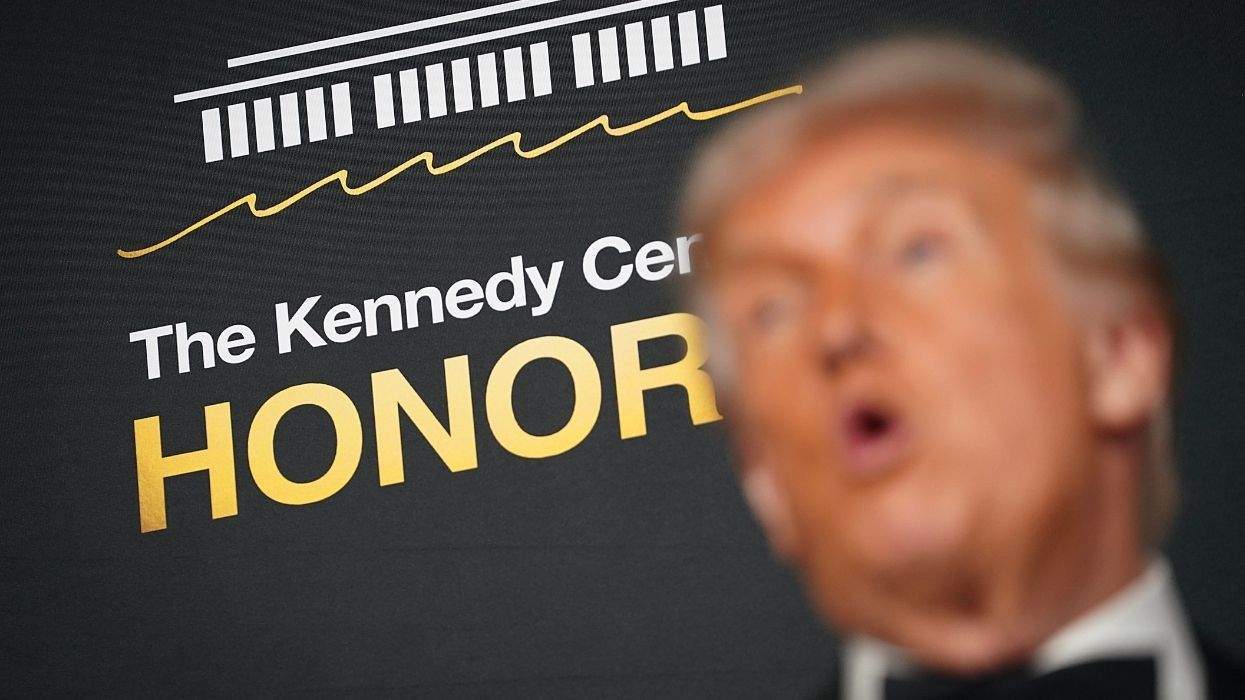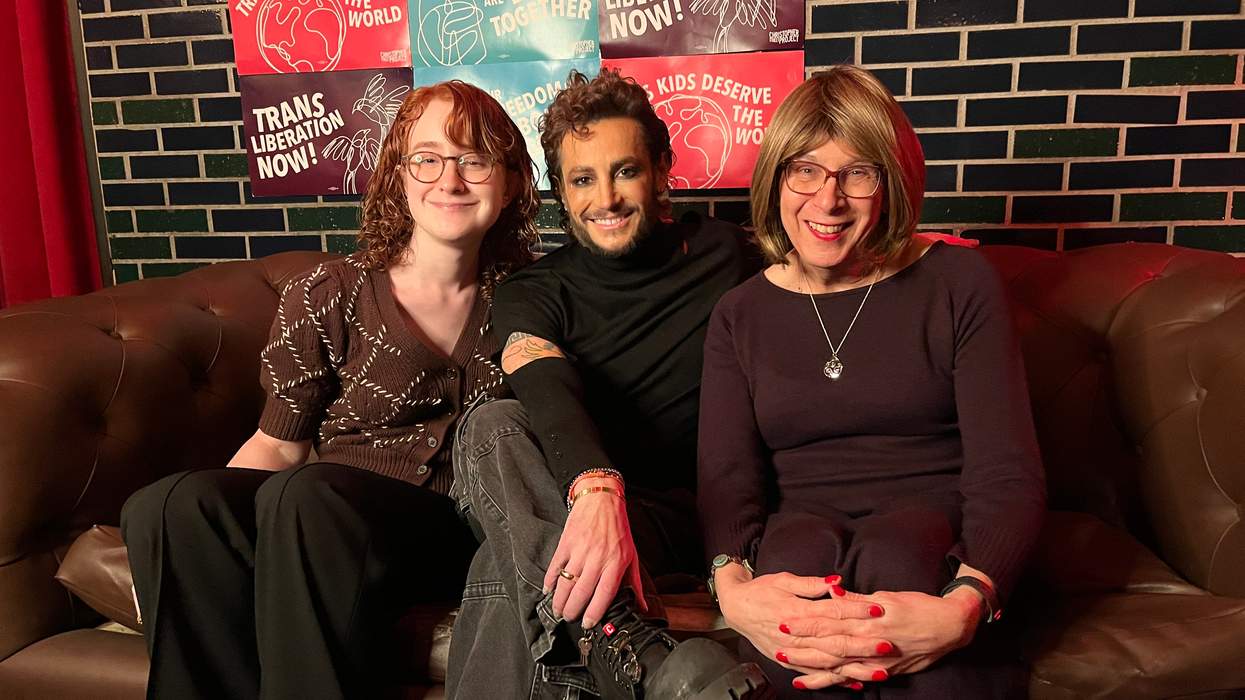Home to nearly 7 million people, Washington is the most populous state in the West behind California and a coveted outpost for advocates waging the state-by-state marriage equality battle. The Evergreen State took a promising step toward handing the region a victory earlier this month when Gov. Christine Gregoire proposed a same-sex marriage bill, becoming one of a handful of state chief executives, all Democrats and Catholics, to push the issue, and the only woman among their ranks.
"It's been always on my mind tangentially and thinking about it, but I knew now was the time to face it," she said in an interview with The Advocate the week after her January 4 announcement. "And as I faced it both as a mom and as a wife and as a Catholic, as a governor, and wrote it down on a piece of paper, the logic of it all fell into the words that I put down there."
During her press conference at the capitol in Olympia, the former attorney general read a 10-minute statement that debunked familiar arguments against marriage equality, such as reserving marriage for heterosexual procreation, and drew parallels to earlier fights against racial and sex discrimination. Three months of preparation went into the speech, including a 3 a.m. session in which she honed the language to encourage the state legislature to consider the issue "thoughtfully and respectfully."
"I wanted everything in there that I'd ever heard, and I wanted to take it on squarely," she said. "The idea of separate but equal is not equal."
Momentum exists for the marriage equality bill, where 23 senators, including two Republicans, support the measure, leaving it two votes shy of the 25 needed for passage in the Democratic-controlled chamber. The bill is expected to clear the House, and public hearings are scheduled for this Monday. Meanwhile, the governor and advocates continue to lobby a bipartisan group of six undecided senators, and one conservative Democrat on the fence plans to announce his position Thursday afternoon.
Gregoire expressed cautious optimism about the prospects for the bill, saying that one immediate obstacle concerned whether lawmakers would agree to pass it as filed, without a referendum clause. Such a clause would impose a requirement that the voting public approve the measure. As it stands now, under state law, if the bill passes without a referendum clause, petitioners would still have the right to challenge it, but only after gathering 120,557 valid signatures.
"One of the big issues, frankly, is that I believe we have sufficient numbers to get the votes and put it on the ballot. That's not what I'm trying to do," she said. "I'm trying to get the votes, period. I think it's time for the legislature to step up and accept responsibility and take the vote, and not just say, 'OK, give it over to the people.' There's where the big effort lies right now and I'm absolutely working it."
The governor declined to say whether she would compromise if presented with a bill that included a referendum requirement, calling the question "premature." However, she expressed confidence that voters would uphold marriage equality in the event of a referendum, citing a University of Washington poll that found support at 55%. The state became the first to affirm same-sex relationship recognition in a public vote when voters approved Referendum 71 in 2009 to maintain an expanded domestic-partnership law. Washington United for Marriage, the coalition of groups working on the bill this year, has accounted for the possibility of a referendum in its strategy.
"I'm not convinced that once we get to the 25, we don't get more," said Gregoire. "It's going to be hard to get to the 25, but once we get to the 25, when the vote actually happens on the floor, I won't be surprised if we get more."
The governor said the timing of any vote remained uncertain and hinged in large part on the budget situation, where Washington faces a $2 billion gap. Sen. Ed Murray, the gay man who chairs of the Ways and Means Committee, is tasked with writing the budget and also carries the marriage equality bill. Rep. Jamie Pedersen, also gay, and chair of the Judiciary Committee, which will host a public hearing January 23, carries the bill in the House.
Depending on the outcome, Washington could become the seventh state, in addition to the District of Columbia, with marriage equality. Bills are also pending this session in Maryland and New Jersey, where governors Martin O'Malley and Chris Christie, like Gregoire and Andrew Cuomo in New York, are Roman Catholics. O'Malley has backed the bill, while Christie, a Republican, has sounded noncommittal lately when asked about his previous veto threat.
Gregoire asked her staff to model the bill's religious exemptions on the New York law, which protects religious organizations and affiliated groups that refuse to solemnize same-sex marriages or provide facilities and services for their celebration. Lawmakers in New Jersey also identified New York as the model for their bill introduced last week.
While cautioning that New York and Washington State are "completely different," Gregoire said she found Cuomo's approach to the Catholic Church during the marriage equality debate instructive. The New York governor personally spoke with Archbishop Timothy Dolan, now a cardinal-designate, who dispensed strong rhetoric but overall seemed to mute his efforts. When the time arrived for last-minute lobbying in June, for instance, Dolan could be found on Gregoire's turf, at a bishops' conference in Seattle.
Similarly, Gregoire spoke with Seattle archbishop J. Peter Sartain in a "very respectful and appreciative" conversation before she made her public announcement. Still, the archbishop and three other bishops issued a letter Friday in opposition to the marriage equality bill, arguing that married heterosexual couples make an "irreplaceable" social contribution that would be jeopardized by any change in the law. Stephen Pidgeon, the attorney behind Referendum 71, also opposes the bill. Washington State already has a Defense of Marriage Act, passed in 1998, but he has filed an initiative seeking to put even more restrictive language in the law.
The bishops' letter makes no mention of a "war" against religious liberty. Catholic figures such as Dolan and Republican presidential candidate Newt Gingrich have used the language in recent months to describe circumstances they claim force religious groups like Catholic Charities to cease adoption and other services rather than comply with marriage equality and civil union laws. Gregoire, who worked with foster child placements as an assistant attorney general, called their rhetoric "totally unacceptable."
"It's one thing to allow freedom of religion," she said. "It's another thing to put the state in the position where, in my opinion, it's engaged in discrimination. To the contrary, what I think New York and what we're trying to do here is respect religious freedom."
New York advocates also built support from a coalition of business leaders with ties to the state, something that Gregoire is seeking to replicate in Washington. "It's premature to tell you that I have anything, but I'm working it," she said. Prominent companies based in the state include Microsoft and Starbucks, both of which signed a brief in November calling for repeal of the federal Defense of Marriage Act.
Gregoire backed those steps even as she continued to struggle with the idea of same-sex marriage. A longtime supporter of reproductive rights, she remembers grappling with marriage equality as early as 2004, as she left the attorney general's office while cases were being filed against the state's DOMA. "There I was defending, and I couldn't find an argument that I thought passed muster," she said. When the Washington State Supreme Court struck down the challenge in 2006 for reasons including procreation and "the well-being of children," she said, "That really started me thinking on it."
The married governor also discussed the subject with gay friends, the children of same-sex couples, and her own daughters, ages 32 and 27, who she said represent a generation that has embraced equality the way baby boomers rallied against racial discrimination. She informed them of her decision to support marriage equality in a teary exchange this past Thanksgiving.
"I've gotten to the point where I don't feel right," she said. "I think it's fundamentally wrong to discriminate. At the same time, I have accepted my religion can have religious freedom to do what it chooses to do, but that cannot allow a state to engage in discrimination, so that's been my evolution."
Gregoire announced in June that she would not run for reelection this year. She vigorously dismisses the question of whether political timing accounts for her changed position.
"I'm not one who goes out and talks about myself personally at all," she said. "So going out there and opening myself up was unique for me. It had nothing to do with politics. Who knows? I could run for something else in the future."
In the meantime, she has a marriage equality bill to push and a flood of correspondence to read, including supportive letters from priests and a 16-year-old Catholic lesbian. The young girl wrote to say that encouragement from her parents and people like the governor has kept her from taking her own life.
A former chairwoman of the National Governors Association, Gregoire declined to offer any advice to colleagues such as Beverly Perdue of North Carolina, the nation's only other Democratic female governor. Governor Perdue has said she opposes the anti-marriage equality constitutional amendment before voters in her state this May, but she believes that marriage is between a man and a woman.
The same goes for President Obama, whom Gregoire endorsed early in 2008. She said that she hopes the president arrives at the point she has while in office, but she respects that he appears to be on a "personal journey."
"If I can be successful here, I hope I can be helpful elsewhere," she said. "It's my job to be successful here before I go out and advocate to others."















Charlie Kirk DID say stoning gay people was the 'perfect law' — and these other heinous quotes
These are some of his worst comments about LGBTQ+ people made by Charlie Kirk.